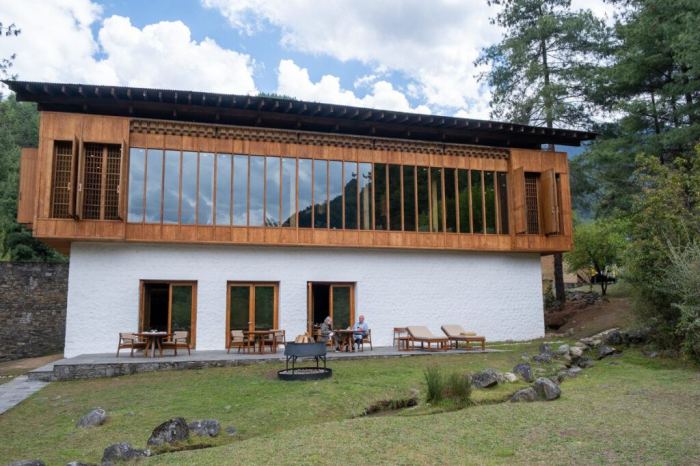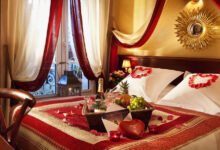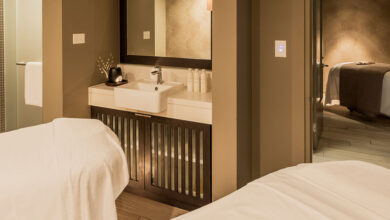Best Bhutan Boutique Hotels Culture, Calm, and Comfort
Best boutique hotels in Bhutan offering cultural immersion and tranquility await! Imagine waking to the scent of pine, the distant sound of prayer flags fluttering, and the promise of a day filled with ancient traditions and breathtaking landscapes. These aren’t just hotels; they’re portals to a different way of life, meticulously designed to blend the rich tapestry of Bhutanese culture with modern comfort and unparalleled serenity.
Prepare to be captivated by unique architecture, personalized service, and experiences that will leave an indelible mark on your soul.
Bhutan’s boutique hotels offer a unique blend of luxury and authenticity. Unlike larger establishments, they emphasize intimate settings, personalized service, and a deep connection to the local culture. Their design often incorporates traditional Bhutanese architecture and craftsmanship, creating a harmonious balance between modern amenities and cultural heritage. From curated cultural experiences like traditional cooking classes and meditation sessions to breathtaking locations nestled in serene valleys or amidst stunning mountain vistas, these hotels promise a truly unforgettable escape.
Defining “Boutique Hotel” in the Bhutanese Context
In Bhutan, the term “boutique hotel” signifies much more than just a small hotel; it represents a unique blend of intimate luxury, cultural immersion, and sustainable practices deeply rooted in the kingdom’s rich heritage. Unlike larger, international hotel chains, Bhutanese boutique hotels prioritize personalized service, a strong connection to the local community, and a commitment to preserving Bhutan’s unique environment and cultural identity.
They offer a more authentic and immersive experience than larger hotels, focusing on quality over quantity.Boutique hotels in Bhutan differ significantly from larger, more conventional hotels primarily in their scale, design philosophy, and level of personalized service. Larger hotels often prioritize efficiency and standardized experiences, sometimes at the expense of cultural sensitivity. In contrast, boutique hotels strive to create a unique and memorable experience tailored to each guest, fostering a deeper connection with Bhutanese culture and the natural environment.
Typical Size and Scale of Bhutanese Boutique Hotels
Bhutanese boutique hotels are generally smaller in scale than their larger counterparts. They typically range from a handful of rooms to perhaps 20-30, allowing for a more intimate and personalized experience. This smaller size contributes to a more welcoming and less impersonal atmosphere. The emphasis is on creating a feeling of exclusivity and personal attention, rather than mass tourism.
This intimate setting often allows for a more direct interaction with the hotel staff and a greater understanding of Bhutanese hospitality. For example, a boutique hotel might be housed in a beautifully restored traditional farmhouse, offering a truly unique and unforgettable stay, in contrast to the standardized rooms of a larger hotel chain.
Design Elements Reflecting Local Culture and Architecture
The design of Bhutanese boutique hotels is a crucial element distinguishing them from larger hotels. Architects and designers meticulously incorporate traditional Bhutanese architectural elements and design principles. This often involves the use of natural materials like wood, stone, and locally sourced textiles. Traditional Bhutanese motifs, such as intricate wood carvings, vibrant thangkas (religious paintings), and handcrafted textiles, are often integrated into the décor, creating a harmonious blend of modern comfort and traditional aesthetics.
The overall design aims to evoke a sense of place and immerse guests in the rich cultural heritage of Bhutan. For instance, a hotel might feature traditional dzong-style architecture (fortresses), incorporating elements like sloped roofs, intricate window frames, and vibrant wall paintings, reflecting the country’s architectural heritage. The use of local craftsmanship is also prevalent, ensuring that the hotel’s aesthetic is genuinely Bhutanese and supports local artisans.
Cultural Immersion Experiences Offered
Bhutanese boutique hotels go beyond simply providing luxurious accommodation; they actively curate immersive cultural experiences for their guests. These experiences are designed to provide a genuine understanding and appreciation of Bhutanese traditions, art, and way of life, often going far beyond the typical tourist trail. The integration of local customs is not merely a marketing ploy but a fundamental aspect of the hotel’s ethos, reflecting Bhutan’s commitment to preserving its unique cultural heritage.
Many hotels partner with local artisans, communities, and cultural institutions to create authentic programs. This collaboration ensures that guests interact directly with the heart of Bhutanese culture, gaining a deeper understanding than what a typical sightseeing tour could offer. The experiences are carefully crafted to be respectful and engaging, balancing the needs of the guests with the preservation of local traditions.
Examples of Cultural Activities and Programs
Bhutanese boutique hotels offer a wide array of cultural activities. Guests might participate in traditional cooking classes, learning to prepare delicious Bhutanese dishes like ema datshi (chilli cheese) or shamu datsi (pork and cheese). They might also attend a masked dance performance (Cham), a vibrant and captivating display of Bhutanese religious art. Other common experiences include visits to local villages, offering opportunities to interact with villagers, learn about their daily lives, and witness traditional weaving or pottery techniques.
Some hotels even arrange for guests to participate in a tshechu (religious festival), a colorful and deeply spiritual event that showcases Bhutanese arts and traditions. Additionally, workshops on traditional Bhutanese arts and crafts, like painting thangkas (religious scrolls) or weaving textiles, are frequently offered.
Integration of Local Traditions and Customs
The integration of local traditions is evident in many aspects of the guest experience. Hotels often incorporate traditional Bhutanese architecture and design elements in their buildings, creating a visually immersive environment. The use of local materials and craftsmanship is prevalent, supporting local artisans and showcasing Bhutanese artistry. Staff members often wear traditional kira (for women) and gho (for men), adding to the authentic atmosphere.
Menus often feature locally sourced ingredients, highlighting the fresh and unique flavors of Bhutanese cuisine. Beyond material aspects, the hotels emphasize respectful interactions with local communities, encouraging guests to learn about and appreciate Bhutanese etiquette and customs. Many hotels also incorporate Buddhist principles of mindfulness and tranquility into their services, creating a holistic and enriching experience.
Comparison of Cultural Immersion Offerings
| Hotel | Traditional Arts & Crafts | Cultural Performances | Community Interactions |
|---|---|---|---|
| Hotel A (Example) | Weaving workshop, Thangka painting demonstration | Cham dance performance, traditional music concert | Village visit, interaction with local artisans |
| Hotel B (Example) | Pottery class, traditional mask making | Religious festival attendance (seasonal), storytelling session | Homestay experience with a local family |
| Hotel C (Example) | Traditional textile dyeing, wood carving demonstration | Traditional dance lessons, monastic chanting session | Visit to a local monastery, participation in a religious ceremony |
Tranquility and Relaxation Features
Bhutanese boutique hotels excel in crafting tranquil environments that go beyond mere comfort. Their success lies in a harmonious blend of thoughtful design, mindful location choices, and a deep respect for the surrounding natural beauty, all contributing to an atmosphere of profound peace and rejuvenation. This serenity is carefully cultivated, allowing guests to truly disconnect and reconnect with themselves and the stunning Bhutanese landscape.The key to achieving this tranquil ambiance is a multifaceted approach.
It’s not simply about plush furnishings, but a holistic experience designed to soothe the mind, body, and soul. The hotels leverage the inherent serenity of their locations and enhance it through considered design choices and luxurious amenities.
Spa Facilities and Wellness Treatments
Many Bhutanese boutique hotels incorporate spa facilities that seamlessly blend traditional Bhutanese healing practices with modern wellness techniques. These spas often feature treatment rooms with calming earth tones and natural light, creating a sanctuary for relaxation. Treatments might include traditional hot stone massages using locally sourced stones, herbal steam baths utilizing medicinal plants, and meditation sessions guided by experienced practitioners.
The focus is on using natural ingredients and promoting holistic well-being, creating a genuinely restorative experience. For example, the Como Uma Paro offers a spa with stunning views of the Himalayas, providing a truly immersive and rejuvenating experience.
Garden Design and Outdoor Spaces
The integration of meticulously landscaped gardens and peaceful outdoor spaces is a hallmark of Bhutanese boutique hotels committed to tranquility. These gardens are often designed to evoke a sense of calm, utilizing native plants and flowers to create a visually appealing and naturally fragrant environment. Features like tranquil ponds, carefully placed seating areas offering breathtaking views, and walking paths winding through lush greenery invite guests to unwind and connect with nature.
The careful placement of these elements ensures privacy and quiet contemplation, further enhancing the sense of seclusion and peace. Imagine a hotel with a garden featuring prayer flags fluttering gently in the breeze, the sound of a nearby stream, and the scent of blooming rhododendrons – a truly sensory experience of tranquility.
Room Layouts and Interior Design
The design of the guest rooms themselves contributes significantly to the overall tranquil atmosphere. Many hotels prioritize natural light and ventilation, minimizing the use of artificial lighting and air conditioning whenever possible. Room layouts often incorporate elements of traditional Bhutanese architecture, such as large windows offering panoramic views and minimalist furnishings made from locally sourced wood. Neutral color palettes, soft textures, and the incorporation of natural materials such as stone and wood create a sense of warmth and serenity.
Bhutan’s boutique hotels offer a unique blend of cultural immersion and tranquil escapes, perfect for those seeking a peaceful getaway. For a different kind of family adventure, consider exploring beautiful beaches and exciting nature activities, perhaps checking out some great options like those found on this helpful site: Family-friendly resorts in Langkawi with beautiful beaches and nature activities.
But for a truly immersive cultural experience, Bhutan’s serene hotels remain unmatched.
The overall effect is a space that feels both luxurious and deeply connected to the natural environment, promoting a sense of calm and relaxation.
Location and Surrounding Environment
The location of these boutique hotels plays a crucial role in their peaceful ambiance. Many are nestled in remote valleys, perched on mountain slopes overlooking stunning landscapes, or situated near serene rivers or forests. This secluded setting, far from the hustle and bustle of city life, provides an immediate sense of escape and tranquility. The surrounding natural beauty, whether it’s the majestic Himalayas, lush rice paddies, or dense forests, offers a constant source of visual and auditory stimulation that promotes relaxation and mental clarity.
The absence of intrusive noise and light pollution further enhances the feeling of peace and seclusion. For example, a hotel located high in the mountains, surrounded by pristine forests, offers a dramatically different experience compared to one situated near a busy town.
Location and Accessibility of Hotels: Best Boutique Hotels In Bhutan Offering Cultural Immersion And Tranquility

Source: 123people.it
Choosing a boutique hotel in Bhutan involves careful consideration of its location and how easily you can reach it. Proximity to major attractions and the availability of convenient transportation are key factors in ensuring a smooth and enjoyable travel experience. The mountainous terrain and varied infrastructure across the country mean accessibility differs significantly between regions.
Bhutan’s boutique hotels are strategically located to offer guests a blend of cultural immersion and serene natural beauty. Many are nestled in picturesque valleys or perched on hillsides offering breathtaking views. Understanding the location and accessibility of these hotels is crucial for planning your itinerary and maximizing your time in the Kingdom.
Boutique Hotel Locations by Region
The following list categorizes several exemplary boutique hotels by region, highlighting their accessibility. Note that this is not an exhaustive list, and many other excellent options exist.
- Paro: Paro Valley, home to Paro International Airport, boasts several boutique hotels. Many are within walking distance of Paro Dzong and Tiger’s Nest Monastery (though a hike is required to reach the monastery itself). Taxis and local buses are readily available for transportation to and from the airport and other attractions. Examples might include hotels near the airport offering convenient access, or those slightly further out offering quieter settings but requiring taxi rides to reach attractions.
- Thimphu: Thimphu, the capital city, offers a range of boutique hotels, some centrally located near government buildings, museums, and shopping areas, while others are situated on the outskirts, providing more tranquil settings but requiring taxi or bus rides to reach the city center. The city’s public transportation system is developing, but taxis are generally readily available.
- Punakha: Punakha, known for its stunning Punakha Dzong, has a smaller selection of boutique hotels. Accessibility depends on the specific hotel location; some are close to the Dzong, while others might require a short drive. Transportation options include taxis and, occasionally, local buses. The journey to Punakha from Thimphu or Paro often involves scenic drives, but travel times can be longer due to winding mountain roads.
Accessibility Considerations
Accessibility in Bhutan is influenced by the country’s geography. While major towns have relatively good road networks, reaching some hotels, particularly those in remote areas, might involve challenging terrain and longer travel times. Four-wheel-drive vehicles are often preferred for reaching hotels in more isolated locations. Pre-booking transportation is recommended, especially for hotels outside major towns.
Illustrative Map of Hotel Distribution
Imagine a map of Bhutan. Paro International Airport is located in the western part, marked with a prominent airport symbol. A cluster of hotel icons representing boutique hotels is situated near Paro, close to the airport and along the Paro valley. Further east, a larger cluster of hotel icons is shown in Thimphu, the capital city, with some hotels marked closer to the city center and others slightly outside, indicating varying proximity to attractions.
Finally, a smaller cluster of hotel icons is placed in the central region, representing Punakha, with hotels situated near Punakha Dzong and others further afield. The map visually represents the geographical distribution, highlighting the concentration of hotels in Paro, Thimphu, and a smaller number in Punakha, reflecting the varying levels of accessibility and proximity to key attractions.
Guest Experiences and Testimonials
Guest experiences in Bhutanese boutique hotels are overwhelmingly positive, consistently highlighting the unique blend of cultural immersion and tranquil relaxation offered. Reviews frequently cite the exceptional hospitality, the genuine connection with Bhutanese culture, and the peaceful atmosphere as key elements contributing to unforgettable stays. These experiences vary somewhat depending on the specific hotel and its price point, but the overall sentiment remains consistently high.
Positive Guest Reviews and Common Themes
Many reviews emphasize the personalized service received. Guests often describe feeling welcomed as honored guests rather than just paying customers. For example, one guest staying at a higher-end hotel in Paro described the experience as “being treated like royalty,” noting the staff’s attentiveness and their willingness to go above and beyond to cater to individual needs. Another guest at a more moderately priced hotel in Thimphu highlighted the staff’s genuine warmth and friendliness, stating that “the smiles were infectious and made the entire experience feel incredibly welcoming.” Common themes across various price points include the stunning natural beauty surrounding the hotels, the delicious Bhutanese cuisine, and the opportunities for cultural exchange.
Guests frequently mention feeling a sense of peace and serenity, far removed from the stresses of daily life.
Appreciated Activities and Experiences
Guests consistently appreciate the opportunities for cultural immersion offered by these hotels. This includes guided tours of local villages, participation in traditional Bhutanese ceremonies (such as a monastic blessing), hands-on experiences such as weaving or painting workshops, and interactions with local artisans. Many hotels arrange private meditation sessions or yoga classes, allowing guests to deepen their relaxation and connection with the surroundings.
Bhutan’s best boutique hotels offer a unique blend of cultural immersion and tranquil escapes, perfect for those seeking serenity. For a completely different romantic experience, consider checking out Romantic hotels in Paris with Eiffel Tower views and charming ambiance , before returning to the peaceful, spiritual atmosphere of Bhutan’s stunning landscapes and welcoming culture.
Hiking excursions to nearby monasteries or scenic viewpoints are also popular, offering breathtaking views and a chance to connect with the natural beauty of Bhutan. The opportunity to learn about Bhutanese cuisine through cooking classes or private dining experiences is another highly-rated aspect.
Guest Experiences Across Different Price Ranges
While the core elements of cultural immersion and tranquility are present across all price ranges, the level of luxury and the range of activities offered naturally vary. Higher-end hotels typically offer more luxurious accommodations, such as larger rooms with private balconies, personalized butler service, and spa treatments. They may also arrange more exclusive experiences, such as private guided tours with renowned scholars or access to private meditation retreats.
Mid-range hotels provide a comfortable and authentic experience, focusing on genuine cultural interaction and access to a range of activities. Budget-friendly options still offer opportunities for cultural immersion and relaxation, albeit with more basic accommodations and fewer additional amenities. However, even in budget-friendly hotels, the genuine warmth and hospitality of the Bhutanese people remain consistent, ensuring a memorable and positive experience for all guests.
Sustainability and Environmental Practices

Source: greavesindia.com
Bhutanese boutique hotels are deeply committed to preserving their stunning natural environment and supporting the local communities that thrive alongside it. Sustainability isn’t just a trend; it’s integral to their ethos, woven into the very fabric of their operations and contributing significantly to the unique guest experience. These hotels understand that their success is intrinsically linked to the health of the ecosystem and the well-being of the Bhutanese people.Bhutanese boutique hotels employ a range of sustainable practices to minimize their environmental impact and maximize their positive contribution to the local community.
These practices extend beyond simple eco-friendly gestures and represent a holistic approach to responsible tourism. The focus is on long-term preservation, ensuring the beauty and integrity of Bhutan are maintained for generations to come.
Bhutan’s boutique hotels offer a unique blend of cultural immersion and peaceful tranquility, a stark contrast to the bustling city life. If you prefer a different kind of escape, consider the vibrant energy of Singapore; check out Luxury hotels with ocean views in Singapore near Sentosa Island for a luxurious beach vacation. Then, return to the serene mountains of Bhutan to fully appreciate the contrasting experiences both destinations provide.
Sustainable Practices Implemented by Bhutanese Boutique Hotels
Many Bhutanese boutique hotels actively participate in carbon offsetting programs, investing in renewable energy sources like solar power to reduce their reliance on fossil fuels. Water conservation is a priority, with hotels implementing efficient plumbing systems and encouraging guests to be mindful of their water usage. Waste management programs often involve composting organic waste and recycling initiatives, minimizing landfill contributions.
Bhutan’s best boutique hotels offer a unique blend of cultural immersion and tranquil escapes, perfect for those seeking a peaceful getaway. If you prefer stunning natural landscapes, however, you might consider exploring the options available in Taiwan, like those found on this helpful site: Hotels in Taiwan offering breathtaking mountain views and natural beauty. Ultimately, both destinations provide unforgettable experiences, but cater to different preferences for a relaxing vacation.
Returning to Bhutan, the focus on cultural immersion makes it a truly special choice.
Furthermore, many hotels source locally produced food, supporting local farmers and reducing the carbon footprint associated with food transportation. They also frequently use locally sourced building materials and traditional construction techniques, minimizing the impact on the environment. Some hotels even go beyond these basic practices by engaging in reforestation projects and actively protecting local biodiversity.
Role of Hotels in Supporting Local Communities and Preserving the Environment, Best boutique hotels in Bhutan offering cultural immersion and tranquility
These hotels play a vital role in uplifting local communities. By sourcing goods and services locally, they directly support local businesses and artisans, creating economic opportunities and fostering a sense of community ownership. Employment opportunities within the hotels often prioritize local residents, providing valuable skills and income. Many hotels also actively participate in community development projects, such as supporting local schools or healthcare initiatives.
Their commitment to environmental preservation not only protects the natural beauty that attracts tourists but also safeguards the livelihoods of communities who depend on a healthy environment for their survival. This interconnectedness between the hotel’s success and the well-being of the local community is a cornerstone of their sustainable approach.
Bhutan’s boutique hotels offer a unique blend of cultural immersion and peaceful tranquility, a stark contrast to the bustling city life. If you’re looking for a different kind of experience after exploring Bhutan’s serene landscapes, consider checking out the best budget-friendly hotels in Bangkok near shopping malls, Best budget-friendly hotels in Bangkok near shopping malls , for a vibrant shopping spree.
Then, return to the calming embrace of Bhutan’s tranquil hotels for a truly memorable journey.
Eco-Friendly Initiatives Enhancing Guest Experience
The commitment to sustainability enhances the overall guest experience in several ways. Guests often appreciate the opportunity to stay in hotels that actively work towards environmental protection, aligning with their own values. Experiences like learning about local farming practices, participating in community projects, or simply enjoying the pristine natural beauty preserved by the hotel’s efforts enrich the journey.
The tranquil atmosphere often associated with these eco-conscious hotels contributes to a more relaxing and rejuvenating stay. Knowing that their stay supports local communities and protects the environment adds a layer of meaning and satisfaction to the travel experience, making it more than just a vacation; it becomes a contribution to a sustainable future.
Price and Value Proposition
The cost of a boutique hotel stay in Bhutan offering cultural immersion and tranquility varies significantly depending on several factors, including location, amenities, and the level of luxury provided. Understanding the price range and how it relates to the overall experience is crucial for potential travelers. This section explores the price points and value propositions of these unique hotels.Understanding the pricing structure requires considering that Bhutan’s tourism model emphasizes high-value, low-volume tourism.
This means that while prices might seem higher than comparable hotels in other countries, the cost reflects a commitment to sustainable tourism practices, preserving Bhutanese culture, and providing a truly unique and enriching experience.
Price Ranges for Boutique Hotels in Bhutan
Prices for boutique hotels in Bhutan offering cultural immersion and tranquility typically range from approximately $150 to $1000 per night, per person, on a double occupancy basis. The lower end of this spectrum often represents smaller, family-run guesthouses with basic amenities but a strong focus on cultural interaction. The higher end reflects luxury hotels with extensive amenities, personalized service, and stunning locations.
Bhutan’s boutique hotels offer a unique escape, promising serene cultural immersion unlike anywhere else. If you crave a different kind of energy, however, consider the vibrant atmosphere of Osaka; check out Hotels in Osaka near Dotonbori with vibrant nightlife and entertainment for a completely opposite experience. Then, return to the peaceful tranquility of Bhutan’s stunning landscapes and charming hotels for a truly balanced travel adventure.
This range does not include the mandatory daily Sustainable Development Fee ($65-$250 depending on the season and hotel class) that contributes to Bhutan’s social and environmental initiatives. Keep in mind that packages often include meals and guided tours, which significantly affect the overall cost.
Value Proposition Comparison
The value proposition of a boutique hotel isn’t solely determined by price. A higher price tag doesn’t always equate to a better experience. For example, a smaller, family-run guesthouse might offer a more intimate and authentic cultural experience at a lower cost than a large, luxurious hotel. Conversely, a luxury hotel might offer unparalleled service, breathtaking views, and extensive amenities that justify the higher price.
The best value depends entirely on individual preferences and priorities. A traveler prioritizing immersive cultural interaction might find a smaller guesthouse a better value, while a traveler seeking ultimate relaxation and luxury might prioritize a higher-priced hotel with a spa and other amenities.
Price Reflecting Experience Quality
The price of a Bhutanese boutique hotel reflects several key aspects of the overall experience:
- Accommodation Quality: Higher prices generally correspond to superior accommodation, including room size, amenities (such as private balconies or fireplaces), and overall comfort.
- Service Level: Luxury hotels often offer personalized service, including dedicated butlers or concierges, catering to guests’ individual needs and preferences.
- Location and Accessibility: Hotels in remote, scenic locations often command higher prices due to their exclusivity and the added logistical costs involved in reaching them.
- Cultural Immersion Programs: The inclusion of curated cultural experiences, such as cooking classes, traditional dance performances, or visits to local villages, often increases the overall price.
- Sustainability Practices: Hotels committed to sustainable practices, such as using renewable energy or supporting local communities, may have higher operating costs that are reflected in their pricing.
Ultimately, the best value proposition depends on the individual traveler’s priorities and budget. Careful consideration of what aspects of the experience are most important will guide the choice of hotel and price point.
Closing Notes
Experiencing Bhutan’s boutique hotels is more than just a stay; it’s a journey into the heart of a unique culture and a sanctuary for the soul. From the meticulously crafted details reflecting Bhutanese artistry to the serene landscapes that surround these havens, every aspect is designed to nurture your well-being and provide an immersive cultural experience. Whether you seek adventure, relaxation, or a deeper understanding of Bhutanese traditions, these hotels offer an unparalleled gateway to this remarkable kingdom, leaving you refreshed, rejuvenated, and deeply connected to the beauty of the Himalayas.
Clarifying Questions
What is the best time of year to visit Bhutan for a boutique hotel stay?
Spring (March-May) and autumn (September-November) offer the best weather, with pleasant temperatures and clear skies.
Do I need a visa to visit Bhutan?
Yes, most nationalities require a visa. It’s best to check the specific requirements based on your citizenship well in advance.
What is the typical price range for a boutique hotel in Bhutan?
Prices vary greatly depending on the hotel’s location, amenities, and level of luxury. Expect to pay anywhere from moderate to high-end rates.
How do I get around Bhutan once I arrive?
Transportation options include taxis, buses, and hiring private drivers. Many hotels offer airport transfers and can assist with arranging transportation for excursions.
What kind of clothing is appropriate for visiting Bhutan?
Modest clothing is recommended, especially when visiting religious sites. Layers are advised due to varying temperatures.







